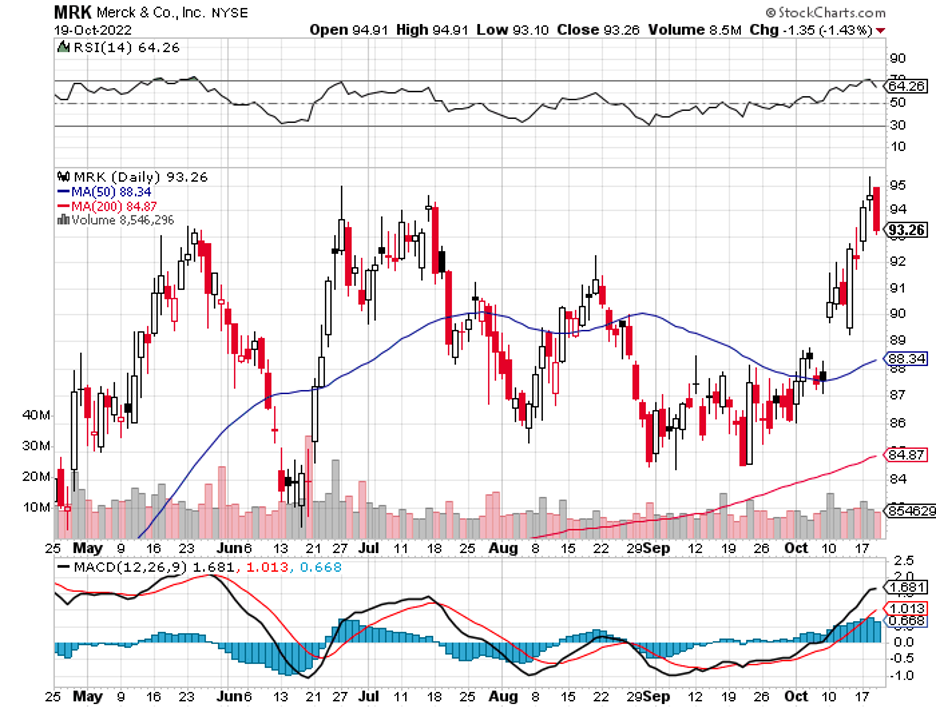A Cure for a Sickening Market
In this sickening market, it makes sense that the biotechnology and healthcare industry is proving to be a great hedge.
This sector has managed to remain one of the handful to post gains in 2022 amidst the seemingly never-ending barrage of negative news caused by the bear market, economic and political turmoil, and even health crises.
The criteria bring me to Merck (MRK), which has performed excellently this year.
Merck is a globally dominant biopharmaceutical company, standing the test of time, and having been in operation for more than 130 years.
It has consistently delivered stable results, showing off a 28% growth in sales in the second quarter of 2022. Among the names in its roster, the most profitable drug is cancer treatment Keytruda, which recorded a 30% year-over-year growth in sales during the same period.
Despite the already remarkable performance of Keytruda, this oncology medication has proven to be capable of targeting more than just lung cancer as it was recently given the green light for 6 additional indications.
In line with ensuring the company is not reliant on a single blockbuster drug, Merck has been aggressive in seeking potential high-selling candidates to add to its portfolio.
Recently, its $11.5 billion bet on Sotatercept, a heart medication, seems to have paid off as the company disclosed positive results from a Phase 3 trial focused on treating a condition called pulmonary arterial hypertension.
It was in 2021 when Merck bought Sotatercept as part of its agreement to acquire Accelerant Pharma. The goal was to find a drug to fill the anticipated revenue gap from the impending patent loss of Keytruda by 2030.
The strategy was high risk at that time because data on Sotatercept were limited on Phase 2 trial results. Nevertheless, Merck paid a significant sum to the company. That was reported as one of the biggest acquisitions of 2021.
Given the current data, the conservative estimate for Sotatercept sales is at $700 million annually. However, the established nature of the target market has some analysts pushing the forecast to potentially reach $4 billion by 2031.
However, unlike other biopharmaceutical companies that heavily depend on one or two blockbuster treatments, Merck has a strong lineup of high-margin products in the market.
Moreover, its pipeline candidates support its solid profitability and investment capital returns for several years. This becomes even more apparent with the spinoff of Organon (OGN) in 2021, where Merck retained a portfolio of drugs with strong patent protection.
It holds a moat-worthy portfolio of specialty treatments in various sectors, including oncology, immunology, cardiometabolic disease, rare diseases, and infections. It also has an extensive vaccine segment that targets HPV, pediatric conditions, shingles, and Hepatitis B.
In the past trailing 12 months, the company generated roughly $57 billion in revenue, with half coming from US sales and the rest internationally.
More importantly, Merck sports a notable 3.1% dividend yield that’s easily supported by a low 35% payout ratio. It reports a 9% five-year CAGR and has an impressive 11-year growth streak.
Throughout the years, Merck’s stock, underlying strategies, and growth model have demonstrated their resilience against macroeconomic headwinds, with the company’s core businesses firing on all cylinders.
It has one of the most solid balance sheets in the industry, which illustrates its financial flexibility to comfortably invest in promising R&D prospects and sustain its dividend at a solid pace.
Overall, Merck is an excellent choice for investors looking to deploy some capital but want to minimize exposure to volatility on top of the possibility of earning some extra dividend income.

